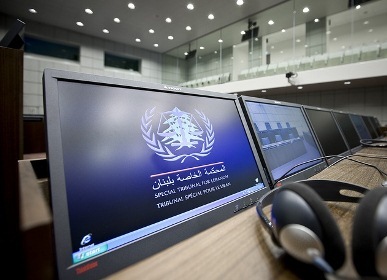Marten Youssef: Contempt Case Not Aimed at Silencing Media, but Protecting STL Witnesses
إقرأ هذا الخبر بالعربية
Spokesperson for the Special Tribunal for Lebanon Marten Youssef defended the tribunal's summons of two Lebanese journalists and two media organizations on charges of contempt for interfering with the administration of justice, saying that legal measures should be taken against the publication of secret affairs linked to trials, reported the pan-Arab daily al-Hayat on Sunday.
He told the daily that the contempt case is not aimed at silencing the Lebanese media, but protecting the witnesses in the case.
It is also aimed at ensuring that justice is not obstructed, he added.
Asked why the journalists and media organizations are being charged and not the source, likely from the STL, who leaked the information on the witnesses, he replied that the investigator in the contempt case did not find evidence that proves that the information was leaked by sources from within the STL.
Youssef stressed however that discovering the source of the leak is part of the case that kicks off on Tuesday.
He explained that the protection of witnesses entails prosecuting media that publishes information that may endanger them, as well as sources that leaked the information, and finally securing their safety.
Any tribunal must take action should it discover a threat to the lives of the witnesses, Youssef stated.
Sources from the tribunal revealed to al-Hayat that some witnesses contacted the STL upon the publication of their names, saying that they felt threatened by the development.
The tribunal is aware that strenuous efforts are being exerted in order to threaten the witnesses and demonstrate that the STL cannot be trusted due to the leaks made to the media, they added.
It therefore had to take legal measures against sides that threaten the witnesses, they explained.
The Contempt Judge at the Special Tribunal for Lebanon has ordered initial appearances on Tuesday of the accused in the case against New TV S.A.L. and Karma Khayat, and of the accused in the case against Akhbar Beirut S.A.L. and Ibrahim al-Amin.
The two journalists and two media organizations were charged with contempt before the tribunal for knowingly and willfully interfering with the administration of justice.
New TV S.A.L. and Khayat, the network's deputy news and political program manager, are charged with “knowingly and willfully interfering with the administration of justice by broadcasting and/or publishing information on purported confidential witnesses” and “knowingly and willfully interfering with the administration of justice by failing to remove from al-Jadeed TV’s website and al-Jadeed TV’s YouTube channel information on purported confidential witnesses.”
Akhbar Beirut S.A.L. and al-Amin, the newspaper's editor-in-chief, are charged with “knowingly and willfully interfering with the administration of justice by publishing information on purported confidential witnesses in the Ayyash et al. Case.”
In April last year, a list of 167 names of so-called witnesses for the former Premier Rafik Hariri trial was published by a previously unknown group identified as "Journalists for the Truth".
The group said it wanted to "unveil the corruption" of the STL.
Both al-Akhbar and al-Jadeed published the list.
Several lawmakers voiced their solidarity with the journalists and slammed the STL for its actions.
Hizbullah's MP Hassan Fadlallah said that the move is an assault on the freedom of the Lebanese, warning: “Any journalist uncovering the corruption of the tribunal will have the same fate as al-Khayat and al-Amin.”
The STL, established at Lebanon's request, seeks to try five members of Hizbullah for the attack that killed former PM Hariri and 22 others on February 14, 2005, in Beirut.
M.T.
The spokesperson was asked about the legitimacy of what he called "Lebanon's" request for the convening of the STL, given that the Taef Accord's reverse power-sharing agreement forces the Shiite majority of the population to divide half of Parliamentary seats with the Sunni community while the Christian minority, perhaps thirty percent, gets the other half to itself. The spokesperson replied, "Sorry, we cannot get into the internal affairs of Lebanon."
I just made this story up. Someone should ask this question of the spokesperson, and when he gives that ridiculous answer, they all--every journalist in the room--should throw their shoes at him.



